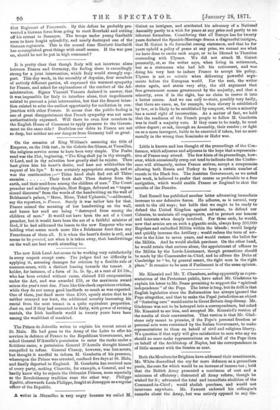Mr. Kinnaird and Mr. T. Chambers, acting apparently as repre--
aentatives of the Protestant public, have asked Mr. Gladstone to. explain his letter to Mr. Dease promising to support the " spiritual- independence " of the Pope. The letter is long, but its drift is that- English legislation since the Reformation has always ignored the- Pope altogether, and that to make the Papal jurisdiction an object. of "fostering care" would excite in Great Britain deep dismay. Mr.. Gladstone was not to be betrayed into a correspondence, but asked Mr. Kinnaird to see him, and accepted Mr. Kinnaird's version of the results of their conversation. That version is that Mr. Glad-- stone only meant to promise, if the Pope's personal freedom or personal acts were restrained by the Italian Government, to make representations to them on behalf of civil and religious liberty. We question if that reply will give satisfaction to men who say we- should no more make representations on behalf of the Pope than on behalf of the Archbishop of Naples, but the correspondence is. of little moment with the Session so near.


































 Previous page
Previous page